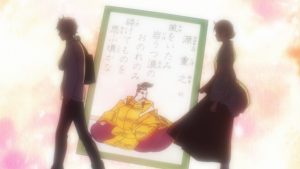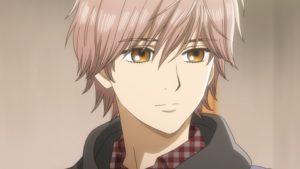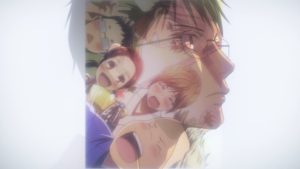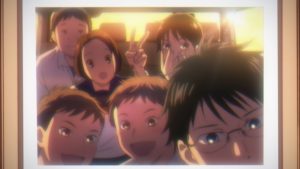Now *that’s* how you use a callback to finish an anime season. As a long-running series, Chihayafuru has both the history and the cast of characters necessary to echo itself in a satisfying way, and the conclusion of this episode is proof. Better yet, it involved all three main characters in the process, repeating Taichi’s past encouragement to Chihaya through Arata in the present. Even when those three are far apart, even when their minds are distracted and their hearts are broken, there’s something about the time they shared as children that keeps them connected. It’s no coincidence that the OP for this third season opened with an image of them as grade schoolers, or that both boys flash back to their elementary days once every few episodes. This finale worked to connect them in a more present sense as well (despite their physical separation), but I have to say that Arata’s text message mirroring Taichi’s faith in his old rival put a beautiful bow on this surprisingly-structured episode.
What do I mean by surprisingly-structured? For one thing, Arata served as its principal character, despite last week’s climactic moment in Chihaya and Taichi’s relationship. You’d think that Chihaya quitting the karuta club or Taichi secretly training with Suo would be the show’s focus, to depict both characters handling the aftermath of their separation. While we did get both of those developments, they were on the periphery of the episode, which spent nearly 14 of its 22 minutes on Arata’s quest to establish a karuta club at Fujioka East. Why push Arata to the forefront of the series now? I think I have the answer, and it’s a simple one: the less we see of Chihaya and Taichi, the more real their severed friendship feels. Sure, you can put them on screen in different scenes and at different locations, but if we watch Taichi go about his day for a bit, then check in with Chihaya for a few minutes, it will still read like “their show.”
That’s actually what this week’s first act felt like to me. One of its very first images was of Taichi walking away from Chihaya, the “waves crashing” poem occupying the space between them. Even though the metaphor of waves being broken by unmoved rocks is repurposed to describe their damaged relationship, the show went to some lengths to connect them. They even had back-to-back scenes linked by the text of the “impassionate gods” poem, which looped across the screen as it cut from Taichi at cram school to Chihaya in the library. If one were sentimentally-minded, one might assume that its last phrase (“I do not know where this love will take me”) hints that their current drifting is part of a larger romantic tale. That’s an interpretation I can’t deny, but in spite of the surviving connection between them, it will probably be some time before they meet face to face again.
In the meantime, we’ve got the adventures of Fujioka East’s karuta club to keep us entertained, and keep me entertained they did, despite the presence of so many new players. Arata’s desire to form a club was sidelined for quite a while after its early introduction this season, but the show didn’t forget about it (honestly, I was afraid that it had). The appeal of this story comes down to a choice line from Sakurazawa near its ending; to paraphrase, she thought that Arata was thinking like a beginner in order to best approach his new responsibilities. Nervously calling out to his teammates, observing an experienced coach giving specific feedback, and meditating on the best way to connect with his new friends – the things that members of other teams would take for granted are all new to Arata. As a matter of fact, the appreciation that he gained for team play in this episode convinced me that he’ll be the one to guide Shinobu out of her self-imposed isolation, rather than Chihaya.
The text of his clubmates that Arata sent to Chihaya was a wonderful bridge between their perspectives to round out the season. As the finale’s second echo from the series’ earliest days, it reminded me of the pride that Chihaya felt at assembling Mizusawa’s club all those years ago. But it also brought the show’s neglect of its original karuta club members back to mind, as the shining faces of characters like Nishida and Tsutomu seemed at odds with their current irrelevance. That’s one of the complaints I’ll have in tomorrow’s series review post, I’m sure, though there will be plenty of praise to go around. Since I’ll be penning a bunch more words about Chihayafuru in the next 24 hours, I feel comfortable ending this post here, but I hope my appreciation for this episode got through. This show may stumble in its characterization from time to time, but it’s always headed somewhere that feels vital. Be it Chihaya, Taichi, or Arata on screen, I’m grateful to have followed their journeys since 2011, and I hope for the opportunity to do so again.
Season 4 when?!




